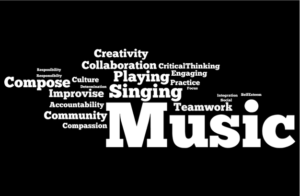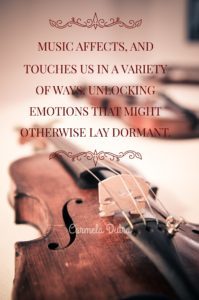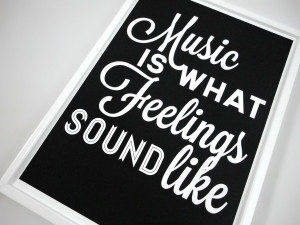The Secret Language of Music
 Can you feel it? The heavy base. Can you hear the soft vocals? Can you visualize the cool ivory keys as you hear the solo of a piano? You are experiencing the emotions of music.
Can you feel it? The heavy base. Can you hear the soft vocals? Can you visualize the cool ivory keys as you hear the solo of a piano? You are experiencing the emotions of music.
Music is a common singularity that crosses all borders of nationality, race, and culture. A tool for arousing emotions and feelings, music is far more powerful than language. An increased interest in how the brain processes musical emotion can be attributed to the way in which it is described as a “language of emotion” across cultures. Be it within films, live orchestras, concerts or a simple home stereo. Music can be so haunting and overwhelming that it can only be described as standing halfway between thought and phenomenon.
Music unquestionably affects our emotions. We tend to listen to music that reflects our mood. When we’re happy we may listen to upbeat music; when we’re sad we may listen to slower, somber like songs; when we’re angry we may listen to darker music with heavy guitar, drums, and vocals that reflect our level of anger.
Have you ever been asked to name your favorite band or performer? Were you able to rattle off the top five you listened to regularly? We may not be able to say for certain why we prefer the artists we listen to. We might say It’s what I grew up hearing. Or even, That’s what my parent’s listened when they were younger. We do know and can say that we resonate with, or feel the music. Or maybe even simpler, we just like the music they write.
 But we can learn a lot about our emotional selves through our musical taste. I know for me that music has a way of bringing out feelings that I didn’t even know I was experiencing. There have been times where I was feeling perfectly fine until I heard a specific song by the amazing Johnny Cash. That was all it took for a flood of emotions, and tears to come to the surface.
But we can learn a lot about our emotional selves through our musical taste. I know for me that music has a way of bringing out feelings that I didn’t even know I was experiencing. There have been times where I was feeling perfectly fine until I heard a specific song by the amazing Johnny Cash. That was all it took for a flood of emotions, and tears to come to the surface.
What about in learning? Can music affect the way one learns? Most defiantly! Research shows that learning the do-re-mis can help children excel in ways beyond the basic ABCs.
More than Just Music.
Research has found that learning music facilitates learning other subjects and enhances skills that children inevitably use in other areas. “A music-rich experience for children of singing, listening and moving is really bringing a very serious benefit to children as they progress into more formal learning,” says Mary Luehrisen, executive director of the National Association of Music Merchants (NAMM) Foundation, a not-for-profit association that promotes the benefits of making music.
Speaking from experience, making music involves more than the voice or fingers playing an instrument; a child learning about music has to tap into multiple skill sets, often simultaneously. For instance, people use their ears and eyes, as well as large and small muscles. Whether your child is the next Beyonce or more likely to sing her solos in the shower, she is bound to benefit from some form of music education.
With my little guy, I can see how music already affects him. Even before he was born he reacted to the music I played. There were specific songs that I would play over, and over, and over some more that I would feel him jumping and moving all over. At four months old, he was moving and smiling to the melody he recognizes. He’s now over a year, and it is so much to watch him dance and shake his head around like a cockatiel to the beat of the music.
The same is true with me, it doesn’t matter where I am or what I am doing. If I hear the theme song to Perry Mason, I instantly stop what I’m doing and look up almost as if to say mentally I know that, I remember that!
 There are some songs that will put my little guy right out! You are my sunshine is his bedtime song. Then the flip side happens, and there are some that just bring out the inner crazy and wake him right up! We can tell if he likes the melody or not just by how he responds. If he likes it, he starts smiling and spinning. If he doesn’t? He will cover his ears, make a face, and wiggles galore as he attempts to get away.
There are some songs that will put my little guy right out! You are my sunshine is his bedtime song. Then the flip side happens, and there are some that just bring out the inner crazy and wake him right up! We can tell if he likes the melody or not just by how he responds. If he likes it, he starts smiling and spinning. If he doesn’t? He will cover his ears, make a face, and wiggles galore as he attempts to get away.
The list of examples that shows the significance of being exposed to music, especially at an early age is immense. Music has been found to play such an important role in education that March has been officially designated by the National Association for Music Education (NAfME) for the observance of Music In Our Schools Month (MIOSM), the time of year when music education becomes the focus of schools across the nation.
The purpose of MIOSM is to raise awareness of the importance of music education for all children – and to remind citizens that school is where all children should have access to music. MIOSM is an opportunity for music teachers to bring their music programs to the attention of the school and the community, and to display the benefits that school music brings to students of all ages.
Over the years I have listened to many different types of music. Ranging from the Blues of Muddy Waters (whom I still enjoy) to the Heavy Metal of Pantera, and everything in between. Each genre reflected a different phase in my life, growing as I grew. Music affects, and touches us in a variety of ways. Unlocking emotions that might otherwise lay dormant.
How has music affected you?




